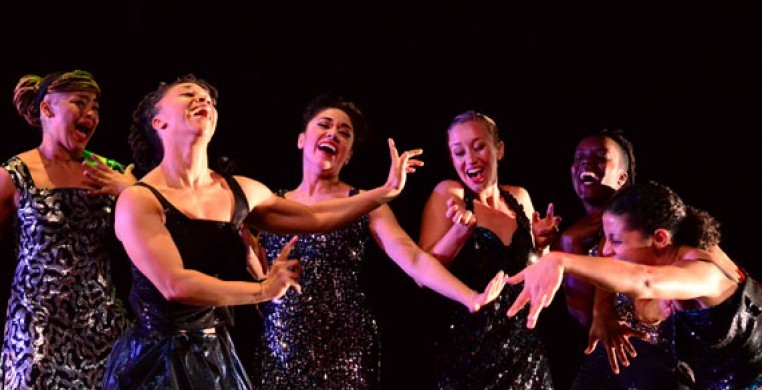“Black” was the word that stood out. "Dark Swan" (2005), the second of a three-piece program during Urban Bush Women’s 30th anniversary tour, which played at the Dance Center March 19-21, captivated onlookers with a riveting spoken sequence in a language that might be best described as a cross between a debilitating stutter and a form of beat boxing. When one of the dancers finally articulates something comprehensible, it’s an unmistakable word: “Black,” she says, staring at the audience with steely-eyed intent, a poignant declaration of both power and race.
For 30 years, Urban Bush Women has made no secret of its politics or ambitions, relishing provocative themes that generally find their inspiration by way of the African diaspora, the centerpiece on which company founder and artistic director Jawole Willa Jo Zollar has made her mark. And as long-lasting a mark as it’s been, Zollar’s intent always seems fresh, touting a prevailing undercurrent that dance is somehow best equipped to confront the most difficult questions when words aren’t enough. “Dark Swan” is not a Zollar original (it came courtesy of the marvelous Nora Chipaumire), but it seemed representative of what Urban Bush Women has strived to achieve over three decades, a company founded on ideals that celebrate the empowerment of both African American culture and women, especially.
Thirty years is a lot to cover in one evening, and it kicked off with a mash-up of performances culled from Zollar’s extensive collection. It began with a recitation of names, most of them familiar: Frederick Douglass, Martin Luther King, Jr. and, perhaps more controversially, Trayvon Martin, Eric Garner and Michael Brown. With clenched fists, Zollar’s dancers assemble, heels pounding like a heard of bulls ready to charge. This was not defense; this was defiance. What started intensely took a turn for something more whimsical, as the dancers formed a circle to begin rapping about themselves, each unique to his/her individual traits. To paraphrase one dancer: “I’m a badass woman and everyone knows it!”
“Dark Swan,” which won guest choreographer Chipaumire a Bessie Award, is a magnificent play on the Russian choreographer Michel Fokine’s “The Dying Swan,” which premiered in 1905 and chronicles the last moments in the life of a swan. But delicacy is quite the opposite of Chipaumire’s investigation. She notes in the program that her inspiration is “in response to classic white/black swans and to celebrate my mother/African/black women who refuse to wither away and die or die beautifully.” Chipaumire’s movement is minimal but daring; the dancers gyrate their bodies so forcefully that, at one point, their feet rumble with thunderous reverberations. The dancers pause intermittently to breathe deeply while negotiating two extremes of struggle and calm. It’s a fight to the bitter end.
Closing the evening is the crowd-pleasing “Hep Hep Sweet Sweet,”(2014) a personal portrait from Zollar that takes place in a fictional nightclub, pieced together from the choreographer’s early childhood memories and the Great Migration of the 20th century, when African Americans began to move from rural southern states to the urban north and Midwest. A recorded voice-over details Zollar’s family migration from the socially divided prairies of Texas to the more forgiving plains of Kansas City. It is in the nightclubs of Kansas City that her parents frequent, according to the story, that Zollar experiences the exhilaration of jazz, the complexities of adulthood and the pain of poverty. One “badass” woman mimics the effusive charm of a lounge singer, flirting with the audience and seductively crossing her legs with kittenish charm, all the while singing a melody of velvety textures that could be both sad and joyful. It was fulfilling, touching and fun. By the end of this beautifully conceived and performed program, it was easy to feel like you were in need of more.

